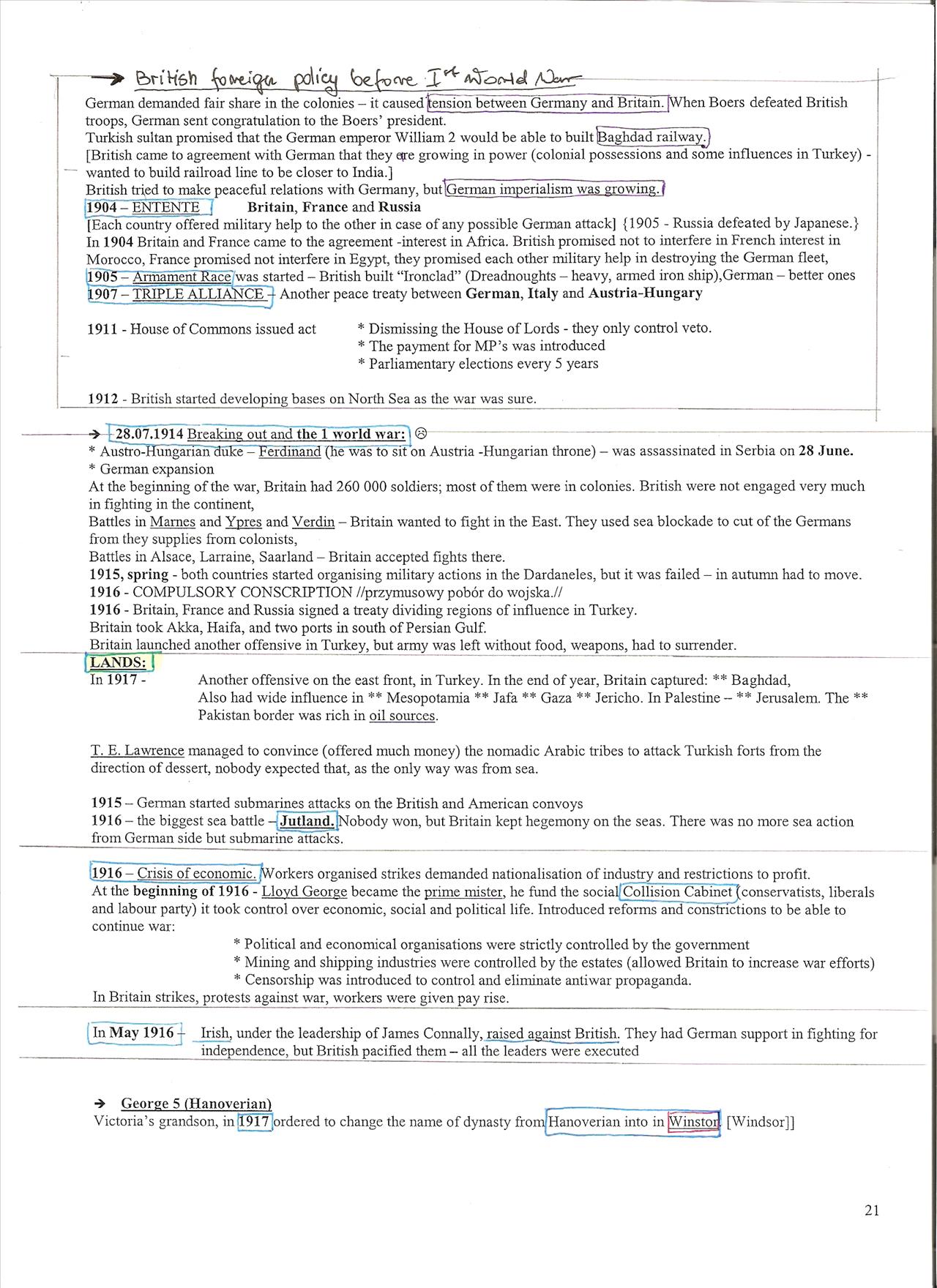skanuj0024 5

—> fonH&yi ^o^c^ot (policij {o^frpore. /Q*rr
German demanded fair share in the colonies - it causedfrension between Germany and BritainTjWhen Boers defeated British troops, German sent congratulation to the Boers’ president.
Turkish sułtan promised that the German emperor William 2 would be able to builtjBaghdad railway
[British came to agreement with German that they e^re growing in power (colonial possessions and some influences in Turkey) -
wanted to build railroad linę to be closer to India.] _ _
British tried to make peaceful relations with Germany, but .German imperialism was growing. f
1904 - ENTENTE J Britain, France and Russia
[Each country offered military help to the other in case of any possible German attack] {1905 - Russia defeated by Japanese.} In 1904 Britain and France came to the agreement -interest in Africa. British promised not to interfere in French interest in Morocco, France promised not interfere in Egypt, they promised each other military help in destroying the German fleet,
1905 ^Xrmament Race was started - British built “Ironclad” (Dreadnoughts - heavy, armed iron ship),German - better ones 1907 - TRI PLE ALLlANCE 4 Another peace treaty between German, Italy and Austria-Hungary
1911 - House of Commons issued act * Dismissing the House of Lords - they only control veto.
* The payment for MP’s was introduced
* Parliamentary elections every 5 years
1912 - British started deyeloping bases on North Sea as the war was surę.
28.07.1914 Breaking out and the 1 world war: > ©
* Austro-HungariarTduke - Ferdinand (he was to sit on Austria -Plungarian throne) - was assassinated in Serbia on 28 June.
* German expansion
At the beginning of the war, Britain had 260 000 soldiers; most of them were in colonies. British were not engaged very much in fighting in the continent,
Battles in Marnes and Ypres and Yerdin - Britain wanted to fight in the East. They used sea blockade to cut of the Germans from they supplies from colonists,
Battles in Alsace, Larraine, Saarland - Britain accepted fights there.
1915, spring - both countries started organising military actions in the Dardaneles, but it was failed - in autumn had to move. 1916 - COMPULSORY CONSCRIPTION //przymusowy pobór do wojska.//
1916 - Britain, France and Russia signed a treaty dividing regions of influence in Turkey.
Britain took Akka, Haifa, and two ports in south of Persian Gulf.
Britain launched another offensive in Turkey, but army was left without food, weapons, had to surrender.
1LANDS: 1
In 1917 - Another offensive on the east front, in Turkey. In the end of year, Britain captured: ** Baghdad,
Also had wide influence in ** Mesopotamia ** Jafa ** Gaza ** Jericho. In Palestine - ** Jerusalem. The ** Pakistan border was rich in oil sources.
T. E. Lawrence managed to convince (offered much money) the nomadic Arabie tribes to attack Turkish forts from the direction of dessert, nobody expected that, as the only way was from sea.
1915 - German started submarines attacks on the British and American convoys
1916 - the biggest sea battle - Jutland.{Nobody won, but Britain kept hegemony on the seas. There was no morę sea action from German side but submarine attacks.
fl916 — Crisis of economic. AYorkers organised strikes demanded nationalisation of industry and restrictions to profit.
At the beginning of 1916 - Lloyd George became the prime mister, he fund the social Collision Gabinet (conservatists, liberals and labour party) it took control over economic, social and political life. Introduced reforms and constrictions to be able to continue war:
* Political and economical organisations were strictly controlled by the government
* Mining and shipping industries were controlled by the estates (allowed Britain to inerease war efforts)
* Censorship was introduced to control and eliminate antiwar propaganda.
In Britain strikes, protests against war, workers were given pay rise.
In May 1916 - Irish, under the leadership of James Connally, raised against British. They had German support in fighting for __independence, but British pacified them - all the leaders were executcd
Hanoverian into in Winstoij [Windsor]]
George 5 (Hanoverian)
Victoria’s grandson, in 1917 ordered to changc the name of dynasty from
21
Wyszukiwarka
Podobne podstrony:
DSCN2880 41) Characterize British foreign policy before 1 World War M German deman
skanuj0002 (76) Anna Blajer-Gołębiewska M. Sc. Exerci.se 5. There is a duopoly in the market. Compan
skanuj0013 (321) • i t. J*! łŁ?«»a; uś-J >1 yiw:; rr»»r« 74 Antropologia
skanuj0015 (307) u i y J7g2EZL i/ik/ 13TxrTli ! cpxt rr teł J3p fl&zd£Z/*fe fc
skanuj0064 (24) ■Tijr.y- — v.CI:.-til > y u-..-.r J— - ^rr~^śx^^^T=227^-nyi,j:~
skanuj0011 (313) *eć2 X?ót/ nfarlnity óiG^hćL.oiy&w-za c^óv£i_
skanuj0011 (85) ,U xi/ ot ** fiUMj - cLo tJjL*. jXk.fHijjL d*V/C» &nbs
49353 skanuj0022 (78) A ( a * ! ypucżiAt ot r ęjbfotc-^gj. B ,U<_____ Cl śs •4 f Y y s n V
moda kobieca XXw str323 :US. Cki lilś ot
21852 skanuj0170 (2) n 4 3*. FfJMł., n fffl J? 4{ S- Hi ‘ .....Ł 5§f
więcej podobnych podstron